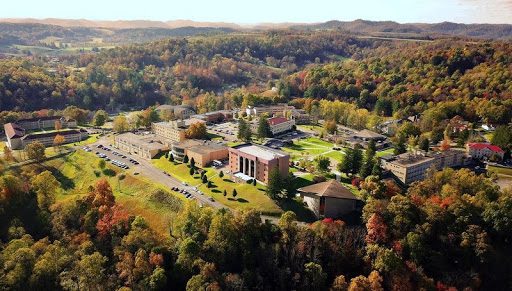In a state that overwhelmingly identifies as Protestant, it is no surprise there are numerous faith-based universities scattered across West Virginia. A student looking for a faith-filled collegiate experience has many options to choose from – both traditional and non-traditional paths as well.
One of these non-traditional paths focuses on sustainability and Creation Care. Many of these universities have these opportunities in common. Regardless of whether they are affiliated with Protestantism in general (Bethany College), identify with a subset of the Protestant faith like the Baptist Church (Alderson Broaddus University and Salem University), the Methodist Church (West Virginia Wesleyan College), or the Presbyterian Church (Davis & Elkins College), align themselves with Catholic doctrine (Wheeling University), or are not connected to any one particular group (Appalachian Bible College and Ohio Valley University), many religious schools throughout West Virginia are moving care for the environment to the front of their agendas through their educational programming, student activities, and administrative practices.

On the academic front, at least half of these schools offer degree programs that intend to educate students about Creation. Alderson Broaddus, Bethany, Davis & Elkins, and West Virginia Wesleyan all offer an environmental science or environmental studies major program; West Virginia Wesleyan also offers an environmental studies minor, while Bethany has an environmental biology minor. Admirably, Davis & Elkins’ environmental science program was ranked fourth in West Virginia in the 2021 PLEXUSS Global Rankings.
For those with more specific interests, Bethany also offers a botany minor for students wanting to dive into the world of plants and a zoology minor for those who prefer animals. This is no surprise given the school collaborates with the Phipps Conservatory and Botanical Gardens to offer hands-on educational experiences in environmental studies. Students with broader interests can pursue a degree in natural resource management at Alderson Broaddus or in sustainability studies at Davis & Elkins.
For the adventurous learner, local West Virginia universities offer immersive study abroad programs with an environmental twist: Riley Queen from West Virginia Wesleyan had the opportunity to study coral reef restoration in Indonesia. Many of these colleges also employ notable professors who shine in their environmental research: Dr. Brandi Gaertner from Alderson Broaddus published an important article about the impact of climate change on the growing season and the process of water evaporation.
While staff has collaborated to offer these significant learning opportunities in classroom settings, students in West Virginia have organized on their own to explore caring for God’s Creation in less formal atmospheres. Four schools have a Biology Club or TriBeta Biology Honor Society, including Bethany, Salem, West Virginia Wesleyan, and Wheeling. Bethany’s TriBeta club in particular has worked to map and label noteworthy trees around their campus. Three schools — Alderson Broaddus, Bethany, and Davis & Elkins — offer an Outdoor or Outdoor Adventure Club to explore the beauty the Mountain State has to offer. Students with a heart for animals will be pleased to know that there is an Equestrian Club at Bethany and the WE LEAD Peer Council at West Virginia Wesleyan has an Animal Welfare & Conservation Team. Other clubs and organizations are more niche but make just as much of an impact on students, campus, and surrounding communities. Alderson Broaddus’s Natural Resources Club engages members in activities ranging from monitoring of water and wildlife habitats to attending environmental conferences.
Bethany’s Greener Bethany organization seeks to educate by organizing events to foster communication about climate change and environmental protection, such as 2020’s Get Outside Day. Greenworks! at Davis & Elkins seeks to make a tangible impact through projects like recycling and community gardening; most significantly, the club is responsible for funding and installing the three solar panels on their campus.
These faith-based colleges have also taken significant strides in their administrative and campus-wide efforts to address climate and sustainability. This starts with their mission statements. Bethany College’s Responsible Citizenship Pathway dedicates the school to preserving and offering hands-on learning within West Virginia’s natural beauty. Ohio Valley University aims to be a good steward for God’s Creation, while Wheeling University’s campus ministry has partnered with the Appalachian Institute to dedicate itself to environmental justice in the Jesuit tradition.
In line with those missions, facilities dedicated to either the environment or the natural sciences are in no short supply. Two schools feature perfect additions for students’ study routines: Bethany has plans to upgrade their botany lab by next year, and Davis & Elkins features a controlled environment chamber and an experimental watershed. Two have buildings dedicated to plants; Davis & Elkins is home to the Tolstead Greenhouse and a Herbarium storing the West Virginia State fungi collection, and Wheeling University is home to a community garden created by the local Green Wheeling Initiative. Additionally, four universities contract with services that are dedicated to sustainability to supply their dining halls: Alderson Broaddus uses Sodexo, Bethany uses Parkhurst Dining, and West Virginia Wesleyan and Wheeling use Aladdin Food Management Services. Davis & Elkins, meanwhile, pursues sustainability with their own D&E Dining Services.
Different institutions focus on different parts of the natural world. Bethany College emphasizes forests: their campus’s Parkinson Forest is now part of the country-wide Old-Growth Forest Network, and their 2020 Earth Day event featured a speech from the founder of that network. Davis & Elkins and West Virginia Wesleyan, on the other hand, highlight clean energy. Davis & Elkins has three solar installations, one of which is the biggest to be housed at a residential college in the state, while West Virginia Wesleyan has a solar canopy with four electric vehicle charging stations. It is clear through their different programs and initiatives, religious universities in this state are going to continue making a positive environmental impact.





 Copyright
2024
Root and Vine
Copyright
2024
Root and Vine